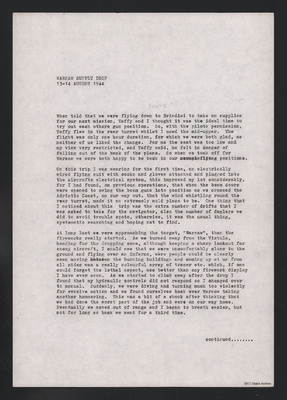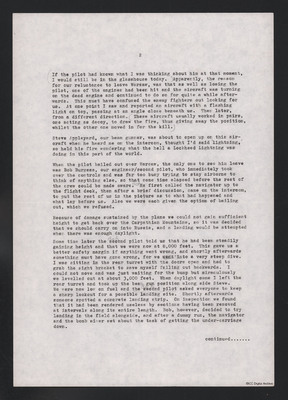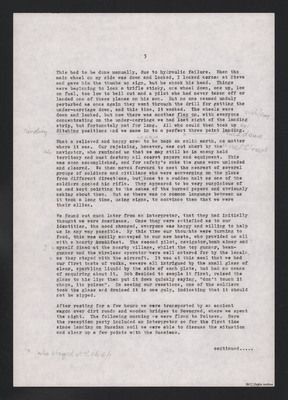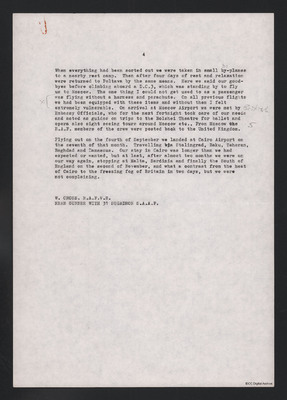Warsaw Supply Drop 13-14 August 1944
Title
Warsaw Supply Drop 13-14 August 1944
Description
William Cross Memoir of a supply drop to Polish fighters. They lost an engine and struggled to maintain height. The pilot had bailed out leaving the rest of the crew to fly the aircraft. They landed successfully in Russian territory and met up with their troops. Afterwards they were transported to Moscow then back to UK via Stalingrad, Syria and Cairo.
Creator
Date
1944-08
Spatial Coverage
Language
Format
Four typewritten sheets
Publisher
Rights
This content is available under a CC BY-NC 4.0 International license (Creative Commons Attribution-NonCommercial 4.0). It has been published ‘as is’ and may contain inaccuracies or culturally inappropriate references that do not necessarily reflect the official policy or position of the University of Lincoln or the International Bomber Command Centre. For more information, visit https://creativecommons.org/licenses/by-nc/4.0/ and https://ibccdigitalarchive.lincoln.ac.uk/omeka/legal.
Contributor
Identifier
BCrossWCrossWv10001,
BCrossWCrossWv10002,
BCrossWCrossWv10003,
BCrossWCrossWv10004
BCrossWCrossWv10002,
BCrossWCrossWv10003,
BCrossWCrossWv10004
Transcription
WARSAW SUPPLY DROP
13-14 AUGUST 1944
When told that we were flying down to Brindisi to take on supplies for our next mission, Taffy [inserted] Lewis [/inserted] and I thought it was the ideal time to try out each others gun position. So, with the pilots permission, Taffy flew in the rear turret whilst I used the mid-upper. The flight was only one hour duration, for which we were both glad, as neither of us liked the change. For me the seat was too low and my view very restricted, and Taffy said, he felt in danger of falling out of the back of the plane. So when we took off for Warsaw we were both happy to be back in our normal flying positions.
On this trip I was wearing for the first time, an electrically wired flying suit with socks and gloves attached and plugged into the aircrafts electrical system, this improved my lot considerably, for I had found, on previous operations, that when the beam doors were opened to swing the beam guns into position as we crossed the Adriatic Coast, on our way out. that the wind whistling round the rear turret, made it an extremely cold place to be. One thing that I noticed about this trip was the extra number of drifts that I was asked to take for the navigator, also the number of doglegs we did to avoid trouble spots, otherwise, it was the usual thing, systematic searching and hoping not to find.
At long last we were approaching the target, “Warsaw”, then the fireworks really started. As we turned away from the Vistula, heading for the dropping zone, although keeping a sharp lookout for enemy aircraft, I could see that we were uncomfortably close to the ground and flying over an inferno, were [sic] people could be clearly seen moving between the burning buildings and coming up at us from all sides was a really colourful array of tracer etc. which, if one could forget the lethal aspect, was better than any firework display I have ever seen. As we started to climb away after the drop I found that my hydraulic controls did not respond so I changed over for evasive action and we found ourselves back over Warsaw taking another hammering. This was a bit of a shock after thinking that we had done the worst part of the job and were on our way home. Eventually we moved out of range and I began to breath easier, but not for long as back we went for a third time.
continued ……..
[page break]
2
[inserted] ( [/inserted] If the pilot had known what I was thinking about him at that moment, I would still be in the glasshouse today. [inserted] ) [/inserted] Apparently, the reason for our reluctance to leave Warsaw, was that as well as losing the pilot, one of the engines had been hit and the aircraft was turning on the dead engine and continued to do so for quite a while afterwards. This must have confused the enemy fighters out looking for us. At one point I saw and reported an aircraft with a flashing light on top, passing at an angle close beneath us. then later, from a different direction. [inserted] ( [/inserted] These aircraft usually worked in pairs, one acting as a decoy, to draw the fire, thus giving away the position, whilst the other one moved in for the kill. [inserted] ) [/inserted]
Steve Appleyard, our beam gunner, was about to open up on this aircraft when he heard me on the intercom, thought I’d said lightning, so held his fire wondering what the hell a Lockheed Lightning was doing in this part of the world.
When the pilot bailed out over Warsaw, the only one to see him leave was Bob Burgess, our engineer/second pilot, who immediately took over the controls and was far too busy trying to stay airborne to think of anything else, so that some time elapsed before the rest of the crew could be made aware. [inserted] Bob [/inserted] He first called the navigator up to the flight deck, then after a brief discussion, came on the intercom, to put the rest of us in the picture as to what had happened and what lay before us. Also we were each given the option of bailing out, which we refused.
Because of damage sustained by the plane we could not gain sufficient height to get back over the Carpathian Mountains, so it was decided that we should carry on into Russia, and a landing would be attempted when there was enough daylight.
Some time later the [inserted] Bob [/inserted] second pilot told us that he had been steadily gaining height and that we were now at 8,000 feet. This gave us a better safety margin if anything went wrong, and shortly afterwards something must have gone wrong, for we went into a very steep dive. I was sitting in the rear turret with the doors open and had to grab the sight bracket to save myself falling out backwards. I could not move and was just waiting for the bump but miraculously we levelled out at about 3,000 feet. When daylight came I left the rear turret and took up the beam gun position along side Steve. We were now low on fuel and [inserted] Bob [/inserted] the second pilot asked everyone to keep a sharp lookout for a possible landing site. Shortly afterwards someone spotted a concrete landing strip. On inspection we found that it had been rendered useless by sections having been removed at intervals along its entire length. Bob, however, decided to try landing in the field alongside, and after a dummy run, the navigator and the bomb aimer set about the task of getting the under-carriage down.
continued …….
[page break]
3
This had to be done manually, due to hydraulic failure. When the main wheel on my side was down and locked, I looked across at Steve and gave him the thumbs up sign, but he shook his head. Things were beginning to look a trifle sticky, one wheel down, one up, low on fuel, too low to bail out and a pilot who had never taken off or landed one of these planes on his own. But no one seemed unduly perturbed as once again they went through the drill for getting the under-carriage down, and this time, it worked. The wheels were down and locked, but now there was another [underlined] flap on, [/underlined] [inserted] problem [/inserted] with everyone concentrating on the under-carriage we had lost sight of the landing strip, but fortunately not for long. All who could then took up [inserted] our landing [/inserted] [underlined] ditching [/underlined] positions and we came in to a perfect [inserted] X [/inserted] [underlined] three point landing. [inserted] touchdown [/inserted]
What a relieved and happy crew [inserted] we were [/inserted] to be back on solid earth, no matter where it was. Our rejoicing, however, was cut short by the [inserted] Lt Noel Sloeat the [/inserted] navigator, who reminded us that we may still be in enemy held territory and must destroy all secret papers and equipment. This was soon accomplished, and for safety’s sake the guns were unloaded and cleared. We then moved forward to meet the nearest of several groups of soldiers and civilians who were converging on the plane from different directions, but [inserted] we [/inserted] came to a sudden halt as one of the soldiers cocked his rifle. They appeared to be very suspicious of us and kept pointing to the ashes of the burned papers and obviously asking about them. But as there was no common language between us it took a long time, using signs, to convince them that we were their allies.
We found out much later from an interpreter, that they had initially thought we were Americans. Once they were satisfied as to our identities, the mood changed, everyone was happy and willing to help us in any way possible. By this time our thoughts were turning to food, this was easily conveyed to our new hosts, who provided us all with a hearty breakfast. The second pilot, navigator, bomb aimer and [inserted] I [/inserted] myself dined at the nearby village, whilst the top gunner, beam-gunner and the wireless operator were well catered for by the locals, as they stayed with the aircraft. It was at this meal that we had our first taste of vodka, we were all intrigued by the small glass of clear, [underlined] sparkling [/underlined] liquid by the side of each plate, but had no means of enquiring about it. Bob decided to sample it first, raised the glass to his lips then put it down quickly saying, “don’t touch it chaps, its poison”. On seeing our reactions, one of the soldiers took the glass and drained it in one gulp, indicating that it should not be sipped.
After resting for a few hours we were transported by an ancient wagon over dirt roads and wooden bridges to Novograd, where we spent the night. The following morning we were flown to Poltava. Here the reception party included an interpreter so for the first time since landing on Russian soil we were able to discuss the situation and clear up a few points with the Russians.
continued …..
[inserted] who stayed with the A/C [/inserted]
[page break]
4
When everything had been sorted out we were taken in small [inserted] bi [/inserted] by-planes to a nearby rest camp. Then after four days of rest and relaxation were returned to Poltava by the same means. Here we said our goodbyes before climbing aboard a D.C.3, which was standing by to fly us to Moscow. The one thing I could not get used to as a passenger was flying without a harness and parachute. On all previous flights we had been equipped with these items and without them I felt extremely vulnerable. On arrival at Moscow Airport we were met by [inserted] British [/inserted] Embassy Officials, who for the next fortnight took care of our needs and acted as guides on trips to the Bolshei [sic] Theatre for ballet and opera also sight seeing tours around Moscow etc., From Moscow the [inserted] 5 [/inserted] R.A.F. members of the crew were posted back to the United Kingdom.
Flying out on the fourth of September we landed at Cairo Airport on the seventh of that month. Travelling via Stalingrad, Baku, Teheran, Baghdad and Damascus. Our stay in Cairo was longer than we had expected or wanted, but at last, after almost two months we were on our way again, stopping at Malta, Sardinia and finally the South of England on the second of November, and what a contrast from the heat of Cairo to the freezing fog of Britain in two days, but we were not complaining.
W. CROSS. R.A.F.V.R.
REAR GUNNER WITH 31 SQUADRON S.A.A.F.
13-14 AUGUST 1944
When told that we were flying down to Brindisi to take on supplies for our next mission, Taffy [inserted] Lewis [/inserted] and I thought it was the ideal time to try out each others gun position. So, with the pilots permission, Taffy flew in the rear turret whilst I used the mid-upper. The flight was only one hour duration, for which we were both glad, as neither of us liked the change. For me the seat was too low and my view very restricted, and Taffy said, he felt in danger of falling out of the back of the plane. So when we took off for Warsaw we were both happy to be back in our normal flying positions.
On this trip I was wearing for the first time, an electrically wired flying suit with socks and gloves attached and plugged into the aircrafts electrical system, this improved my lot considerably, for I had found, on previous operations, that when the beam doors were opened to swing the beam guns into position as we crossed the Adriatic Coast, on our way out. that the wind whistling round the rear turret, made it an extremely cold place to be. One thing that I noticed about this trip was the extra number of drifts that I was asked to take for the navigator, also the number of doglegs we did to avoid trouble spots, otherwise, it was the usual thing, systematic searching and hoping not to find.
At long last we were approaching the target, “Warsaw”, then the fireworks really started. As we turned away from the Vistula, heading for the dropping zone, although keeping a sharp lookout for enemy aircraft, I could see that we were uncomfortably close to the ground and flying over an inferno, were [sic] people could be clearly seen moving between the burning buildings and coming up at us from all sides was a really colourful array of tracer etc. which, if one could forget the lethal aspect, was better than any firework display I have ever seen. As we started to climb away after the drop I found that my hydraulic controls did not respond so I changed over for evasive action and we found ourselves back over Warsaw taking another hammering. This was a bit of a shock after thinking that we had done the worst part of the job and were on our way home. Eventually we moved out of range and I began to breath easier, but not for long as back we went for a third time.
continued ……..
[page break]
2
[inserted] ( [/inserted] If the pilot had known what I was thinking about him at that moment, I would still be in the glasshouse today. [inserted] ) [/inserted] Apparently, the reason for our reluctance to leave Warsaw, was that as well as losing the pilot, one of the engines had been hit and the aircraft was turning on the dead engine and continued to do so for quite a while afterwards. This must have confused the enemy fighters out looking for us. At one point I saw and reported an aircraft with a flashing light on top, passing at an angle close beneath us. then later, from a different direction. [inserted] ( [/inserted] These aircraft usually worked in pairs, one acting as a decoy, to draw the fire, thus giving away the position, whilst the other one moved in for the kill. [inserted] ) [/inserted]
Steve Appleyard, our beam gunner, was about to open up on this aircraft when he heard me on the intercom, thought I’d said lightning, so held his fire wondering what the hell a Lockheed Lightning was doing in this part of the world.
When the pilot bailed out over Warsaw, the only one to see him leave was Bob Burgess, our engineer/second pilot, who immediately took over the controls and was far too busy trying to stay airborne to think of anything else, so that some time elapsed before the rest of the crew could be made aware. [inserted] Bob [/inserted] He first called the navigator up to the flight deck, then after a brief discussion, came on the intercom, to put the rest of us in the picture as to what had happened and what lay before us. Also we were each given the option of bailing out, which we refused.
Because of damage sustained by the plane we could not gain sufficient height to get back over the Carpathian Mountains, so it was decided that we should carry on into Russia, and a landing would be attempted when there was enough daylight.
Some time later the [inserted] Bob [/inserted] second pilot told us that he had been steadily gaining height and that we were now at 8,000 feet. This gave us a better safety margin if anything went wrong, and shortly afterwards something must have gone wrong, for we went into a very steep dive. I was sitting in the rear turret with the doors open and had to grab the sight bracket to save myself falling out backwards. I could not move and was just waiting for the bump but miraculously we levelled out at about 3,000 feet. When daylight came I left the rear turret and took up the beam gun position along side Steve. We were now low on fuel and [inserted] Bob [/inserted] the second pilot asked everyone to keep a sharp lookout for a possible landing site. Shortly afterwards someone spotted a concrete landing strip. On inspection we found that it had been rendered useless by sections having been removed at intervals along its entire length. Bob, however, decided to try landing in the field alongside, and after a dummy run, the navigator and the bomb aimer set about the task of getting the under-carriage down.
continued …….
[page break]
3
This had to be done manually, due to hydraulic failure. When the main wheel on my side was down and locked, I looked across at Steve and gave him the thumbs up sign, but he shook his head. Things were beginning to look a trifle sticky, one wheel down, one up, low on fuel, too low to bail out and a pilot who had never taken off or landed one of these planes on his own. But no one seemed unduly perturbed as once again they went through the drill for getting the under-carriage down, and this time, it worked. The wheels were down and locked, but now there was another [underlined] flap on, [/underlined] [inserted] problem [/inserted] with everyone concentrating on the under-carriage we had lost sight of the landing strip, but fortunately not for long. All who could then took up [inserted] our landing [/inserted] [underlined] ditching [/underlined] positions and we came in to a perfect [inserted] X [/inserted] [underlined] three point landing. [inserted] touchdown [/inserted]
What a relieved and happy crew [inserted] we were [/inserted] to be back on solid earth, no matter where it was. Our rejoicing, however, was cut short by the [inserted] Lt Noel Sloeat the [/inserted] navigator, who reminded us that we may still be in enemy held territory and must destroy all secret papers and equipment. This was soon accomplished, and for safety’s sake the guns were unloaded and cleared. We then moved forward to meet the nearest of several groups of soldiers and civilians who were converging on the plane from different directions, but [inserted] we [/inserted] came to a sudden halt as one of the soldiers cocked his rifle. They appeared to be very suspicious of us and kept pointing to the ashes of the burned papers and obviously asking about them. But as there was no common language between us it took a long time, using signs, to convince them that we were their allies.
We found out much later from an interpreter, that they had initially thought we were Americans. Once they were satisfied as to our identities, the mood changed, everyone was happy and willing to help us in any way possible. By this time our thoughts were turning to food, this was easily conveyed to our new hosts, who provided us all with a hearty breakfast. The second pilot, navigator, bomb aimer and [inserted] I [/inserted] myself dined at the nearby village, whilst the top gunner, beam-gunner and the wireless operator were well catered for by the locals, as they stayed with the aircraft. It was at this meal that we had our first taste of vodka, we were all intrigued by the small glass of clear, [underlined] sparkling [/underlined] liquid by the side of each plate, but had no means of enquiring about it. Bob decided to sample it first, raised the glass to his lips then put it down quickly saying, “don’t touch it chaps, its poison”. On seeing our reactions, one of the soldiers took the glass and drained it in one gulp, indicating that it should not be sipped.
After resting for a few hours we were transported by an ancient wagon over dirt roads and wooden bridges to Novograd, where we spent the night. The following morning we were flown to Poltava. Here the reception party included an interpreter so for the first time since landing on Russian soil we were able to discuss the situation and clear up a few points with the Russians.
continued …..
[inserted] who stayed with the A/C [/inserted]
[page break]
4
When everything had been sorted out we were taken in small [inserted] bi [/inserted] by-planes to a nearby rest camp. Then after four days of rest and relaxation were returned to Poltava by the same means. Here we said our goodbyes before climbing aboard a D.C.3, which was standing by to fly us to Moscow. The one thing I could not get used to as a passenger was flying without a harness and parachute. On all previous flights we had been equipped with these items and without them I felt extremely vulnerable. On arrival at Moscow Airport we were met by [inserted] British [/inserted] Embassy Officials, who for the next fortnight took care of our needs and acted as guides on trips to the Bolshei [sic] Theatre for ballet and opera also sight seeing tours around Moscow etc., From Moscow the [inserted] 5 [/inserted] R.A.F. members of the crew were posted back to the United Kingdom.
Flying out on the fourth of September we landed at Cairo Airport on the seventh of that month. Travelling via Stalingrad, Baku, Teheran, Baghdad and Damascus. Our stay in Cairo was longer than we had expected or wanted, but at last, after almost two months we were on our way again, stopping at Malta, Sardinia and finally the South of England on the second of November, and what a contrast from the heat of Cairo to the freezing fog of Britain in two days, but we were not complaining.
W. CROSS. R.A.F.V.R.
REAR GUNNER WITH 31 SQUADRON S.A.A.F.
Collection
Citation
William Cross, “Warsaw Supply Drop 13-14 August 1944,” IBCC Digital Archive, accessed July 26, 2024, https://ibccdigitalarchive.lincoln.ac.uk/omeka/collections/document/23382.
Item Relations
This item has no relations.




